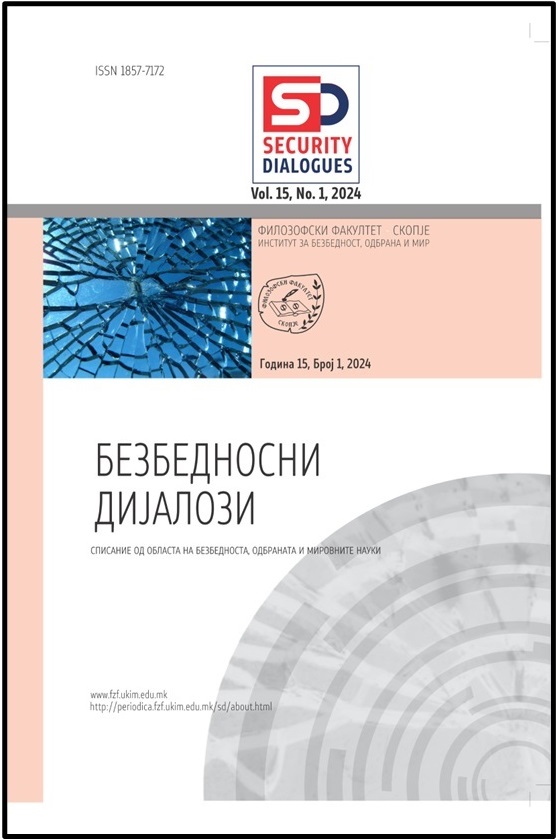Ние зачувуваме аноними кориснички активности. Ве молиме прочитајте ги информациите за приватност за детали.
1. Aim and Scope
The Journal Security Dialogues (SD) is particularly interested in papers that link domestic and international political issues and developments with national and regional security concerns and implications. Security is understood both in its traditional (e.g., interstate wars and conflict, weapons proliferation, military modernization, alliance building, defence and foreign policy, arms control, etc.) and non-traditional (e.g., weak states, civil wars, insurgency movements, ethnic violence, economic crisis, social conflicts, democratic change, transnational terrorism, piracy, human security, etc.) senses. The editors welcome submissions of original and innovative research articles and review articles offering theory-driven empirical analysis and policy prescriptions, which would be of interest to experts and scholars, government officials and policymakers. The journal encourages critical perspectives and innovative approaches to the analysis of issues and problems concerning individual states, Balkan region as well as European and global politics. The SD also publishes reviews of books on all aspects of international relations and security in the Balkans and beyond.
2. Peer Review Process
Unbiased, independent, critical assessment is an intrinsic part of all scholarly work, including scientific investigation. Peer reviewers are experts in their field who are not part of the editorial staff and thus are an important extension of the scientific process. Manuscripts are going through double blind review. Peer reviewers are asked to submit their review within two (2) weeks. In case of divergent opinions, the final decision is made by the editor in chief.
The editors and reviewers Security Dialogues are required to agree to the following statement regarding confidentiality of the process:
As a member of the Security Dialogues editorial team/reviewer, I agree to keep confidential the content of accepted submissions until publication. I also agree to respect the privacy and intellectual property rights of authors who submit material to the journal.
3. Publication Ethics
Ethical standards for publication exist to ensure high-quality scientific publications, public trust in scientific findings, and that people receive credit for their ideas. Scientific misconduct is defined by the Office of Research Integrity as "fabrication, falsification, plagiarism, or other practices that seriously deviate from those that are commonly accepted within the academic community for proposing, conducting, or reporting research." Prilozi/Contributions is a member of the Committee on Publication Ethics (COPE) and abides by its Code of Conduct and aims to adhere to its Best Practice Guidelines. Plagiarism The journal Prilozi/Contributions is committed to publishing only original material, i.e., material that has neither been published elsewhere, nor is under review elsewhere. Manuscripts that are found to have been plagiarized from a manuscript by other authors, whether published or unpublished, will incur plagiarism sanctions. Duplicate Submission Manuscripts that are found to have been published elsewhere, or to be under review elsewhere, will incur duplicate submission/publication sanctions. If authors have used their own previously published work, or work that is currently under review, as the basis for a submitted manuscript, they are required to cite the previous work and indicate how their submitted manuscript offers novel contributions beyond those of the previous work. Citation Manipulation Submitted manuscripts that are found to include citations whose primary purpose is to increase the number of citations to a given author’s work, or to articles published in a particular journal, will incur citation manipulation sanctions. Data Fabrication and Falsification Submitted manuscripts that are found to have either fabricated or falsified experimental results, including the manipulation of images, will incur data fabrication and falsification sanctions. Improper Author Contribution or Attribution All listed authors must have made a significant scientific contribution to the research in the manuscript and approved all its claims. It is important to list everyone who made a significant scientific contribution, including students and laboratory technicians. Redundant Publications Redundant/salami publications involve the inappropriate division of study outcomes into several articles. Sanctions In the event that there are documented violations of any of the above mentioned policies in the journal appropriate sanctions will be applied following the international standards and recommendations.
4. Article processing costs
Security Dialogues does not charge submission or processing fees by the authors.
5. Publication Frequency
Security Dialogues publishes accepted papers after completion of peer-review and editorial processes twice a year - in June and December. The papers are subsequently collated for indexing and citation purposes. By decision of the Editorial board, depending of the inflow of submissions and financial resources, double issues or special/thematic issues could be also published.
6. Open access license
Security Dialogues applies the creative common license CC-BY-NC (https://creativecommons.org/licenses/by-nc/4.0) to published articles. Under this Open Access license, authors agree that anyone can copy and distribute the article for free as long as appropriate credit is given and the article is not modified and not used for commercial purposes.
7. Open Access Policy
This is an open access journal, meaning that all content is freely available without charge to the user or his/her institution. Users are allowed to read, download, copy, distribute, print, search, or link to the full texts of the articles, or use them for any other lawful purpose, without asking prior permission from the publisher or the author as long as they cite the source.
8. Copyright and Permissions
The journal allows the author(s) to hold the copyright without restrictions. The journal allows the author(s) to retain publishing rights without restrictions.
9. Abstracting and Indexing
Security Dialogues is included in the following catalogues, abstracting and indexing databases: EBSCO, CEEOL, DOAJ, European Reference Index for the Humanities (ERIH), Sherpa/Romeo, Directory of Research Journals Indexing (DRJI), Index Copernicus International (ICI), Advanced Science Index (ASI), OAJI - Open Academic Journals Index, Journals for Free, Global Impact Factor, Cite Factor, Research Bible, COBISS.MK, MOAJ, BSZ (Universitatsbibliothek der Ludwig - Maximilians Universitat Munchen (OPAC), ZDB OPAC, Staatsbibliothek zu Berlin, University Library in Hamburg, electronic library of the University of Regensburg. SD has begun the process of obtaining indexation at Scopus.

